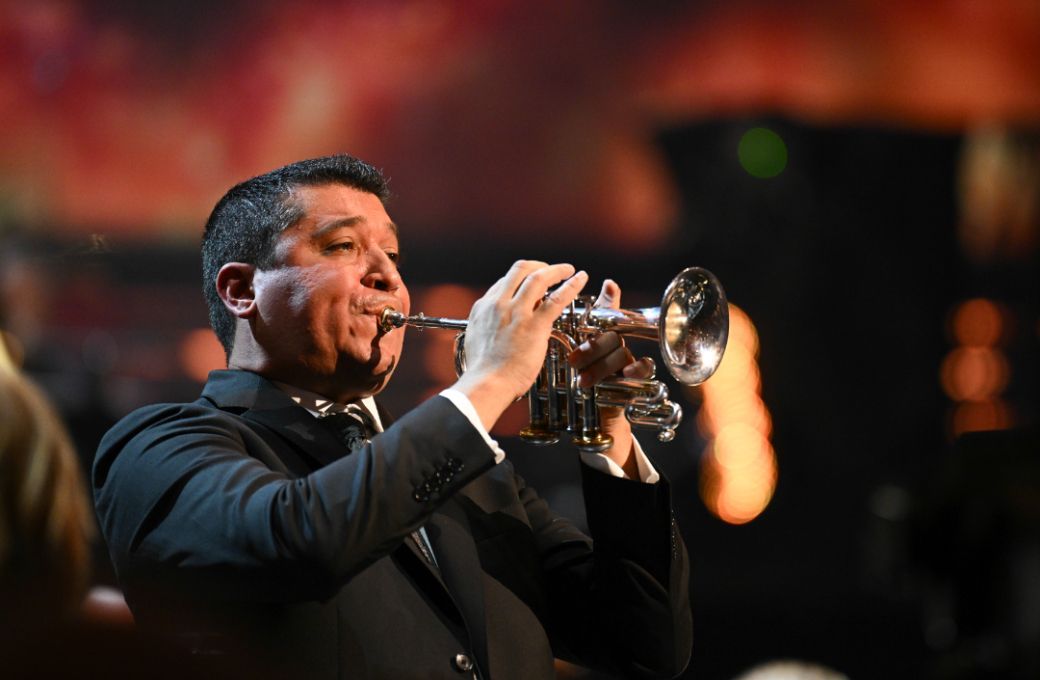The corridors felt less of a scrum than the previous night with Iván Fischer and the Budapest Festival Orchestra. Yet once in, the Royal Albert Hall felt no less packed to its flying mushrooms for the Royal Liverpool Philharmonc Orchestra and Domingo Hindoyan. Clearly people had sussed that this Americas-centred BBC Prom was one of the ones to make a beeline for, and they weren’t wrong.
Adolphus Hailstock’s concert overture, An American Port of Call, came first: a rip-roaring orchestral fireworks show of teeming, contrasting lines, textures and rhythms depicting a busy American port city, written back in 1985 despite this being its European premiere. Hindoyan and his musicians grasped it swaggeringly by the horns, from its opening brass punches and shrilly sweet jazz clarinet smears. In tune with the entire first half, it was a real brass showpiece, topped towards the end by an atmospheric, superbly executed trumpet solo descending from high-register brilliance to super-controlled piano, although the strings were also wooing the ears for all they were worth with their smoothly silky, MGM-style sweep. It was rewarded with a roar of audience approval – magnified as Hindoyan swivelled immediately around and pointed into the stalls to where the composer himself sat beaming. Now spotlit, Hailstock stood up, acknowledged the audience, and blew a delighted kiss towards the stage.
But now, it was time to calm everyone down, because next up was Jennifer Higdon’s single-movement Blue Cathedral, an other-worldly depiction of a soul travelling through a sacred space and upwards into the heavens which was written in 2000, shortly after Hidgon had lost her younger brother to skin cancer. Hindoyan exited the stage, and waited. It worked, and the ensuing poised, steadily onwards-floating, constantly sonically shifting journey concluded with a no less superbly controlled cameo from the young percussionists of Liverpool Philharmonic Youth Company and In Harmony Liverpool, expertly blending their steadily rustling egg-shakers into the chiming, shimmering final chord.

Then back to exuberance for Mexican composer Arturo Márquez’s 2018 Concierto de otoño: three colourful, dance-infused, neo-classical-esque fast-slow-fast movements, performed by the Venezuelan trumpet virtuoso for whom it was written, Pacho Flores. I don’t use the word ‘virtuoso’ lightly. The trumpet’s very opening gambit ends with a descending, detached scale; at the lightening-fast speed and rhythmically precise, crystalline definition with which Flores sprayed its notes into the Royal Albert Hall, jaws hit the floor. Multi-instrument spectacle came from using a bright trumpet in D for outer movements, replaced for the central “Balada de floripondois” movement by, first, a darkly dusky flugelhorn, and then the higher but still mellow soprano cornet in F. Standout highlights included the supreme blend with which the RLPO trumpets occasionally joined in choir with Flores, the finale’s blazingly rapid xylophone solo and Flores’s improvised cadenza, featuring tighter-than-tight trilling and a mischievous sudden turn towards Hindoyan in order to bestow upon him an equally virtuosic throaty trumpet purr.
After all this zinging colour, could Dvořák’s New World Symphony possibly maintain the excitement? And how... This felt like a heart-filled bringing together of all the joy, noise, melancholy, romance, bang, technical finesse and soul we had heard thus far. Maximum contrast. Maximum expression. Sections sharply delineated. Emotions, metrical pull and push, dynamics, phrasing and articulation, all in a sense exaggerated, not to fakeness, but rather to a height of expression that profoundly thrilled, soothed, moved. Rarely has the slow movement opened with such a velvety hymnal quality and such a very long-drawn cor anglais solo, its tension stunningly held; never has the Scherzo sounded so genuinely wildly, primitively whirling. Honestly, what a night.


